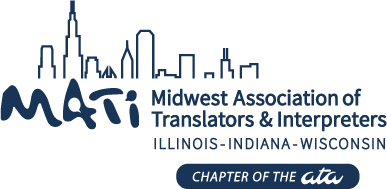Dr. Enrica Ardemagni, “The Changing Interpreting Landscape in the United States”
By Abigail Wright
For the third session of the 13th Annual MATI Conference, we had the privilege of hearing from Dr. Enrica Ardemagni, interpreter, translator, and professor emeritus at Indiana University and Purdue University. Dr. Ardemagni is a founding member and past president of MATI, and current president of the National Council on Interpreters in Health Care (NCIHC). Dr. Ardemagni asked her audience to make scorecards and to assign ourselves points throughout her presentation, based on our awareness of information she would highlight. In a clear illustration of the need for such highlighting, the best score in the room was 16 points...out of a possible 30.
Dr. Ardemagni described the former interpreting landscape as “dreary,” citing deficiencies in areas of consumer knowledge, education and training, industry standards, payment standards, and, in the case of less commonly spoken languages, employability. She asserted that there has, however, been more progress in these areas than is generally assumed.
Historically, these problems have manifested themselves in the use of ad hoc interpreters, who often aren’t really interpreters at all, but a patient or client’s friends or family, or perhaps students whose training remains woefully incomplete. This is the result of, among other things, a lack of hiring criteria and poor performance measurement systems. If, for example, patient satisfaction surveys are the only measure, they can be misleading. A patient will certainly rate his or her Spanish-speaking brother highly, but that does not mean he is actually a good interpreter. This lack of standardization and accountability could lead, and has led, to disastrous consequences, from patient deaths to incorrect verdicts and inappropriate sentencing in court.
However, as Dr. Ardemagni explained, there has been improvement, with both external regulation and internal professionalization bringing slow but certain change. External regulation has come in the form of legislation, beginning with Title VI of the Civil Rights Act of 1964, to a 2004 mandate by the Department of Health and Human Services that requires patients of limited English proficiency to be notified of available interpreters, to 2010’s landmark Affordable Care Act.
Within the profession, improvements have come in the form of codes of ethics, standards of practice, an increase in curricula and training programs, and the creation of numerous organizations: the American Translators Association (ATA), the National Association of Judiciary Interpreters and Translators (NAJIT), the aforementioned NCIHC, the Massachusetts Medical Interpreters Association and the International Medical Interpreters Association (MMIA and IMIA), the California Healthcare Interpreting Association (CHIA), the Registry of Interpreters for the Deaf (RID), the International Association of Conference Interpreters (AIIC), The American Association of Language Specialists (TAALS), the Certification Commission for Healthcare Interpreters (CCHI), the National Board of Certification for Medical Interpreters (NBCMI), Federal Court Interpreter Certification (FCIC), the National Center for State Courts (NCSC), National Interpreter Certification (NIC), the newly created Center for the Assessment of Sign Language Interpretation (CASLI), and the Court Interpreter Training Institute (CITI).
For each of these organizations, Dr. Ardemagni provided first the abbreviation or acronym, then instructed audience members who knew the full name to assign themselves one point. Those who were members of the associations and/or certified by them earned an additional point for this. Naturally, with so much variation and specialization, no one was going to earn that additional point for all of them, but now, thanks to Dr. Ardemagni, individual audience members of greatly varying specialties and niches all have a better idea of where to go to receive their proper qualifications and find their community.
Abigail Wright is a freelance Spanish-to-English translator. She is a 2016 graduate of the Master of Arts in Translation and Interpreting program at the University of Illinois at Urbana-Champaign and recently started her own company, Wright Translations, LLC. She has been a MATI member since 2015.
